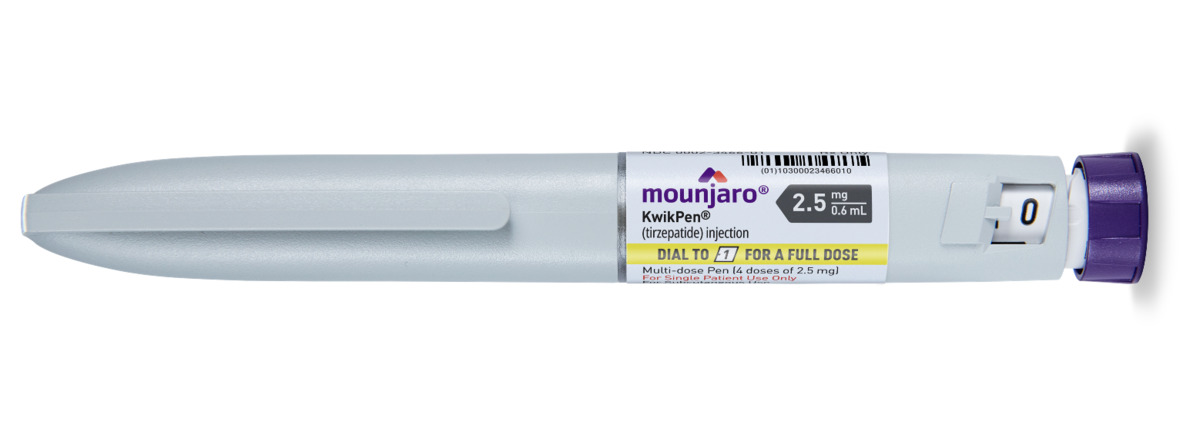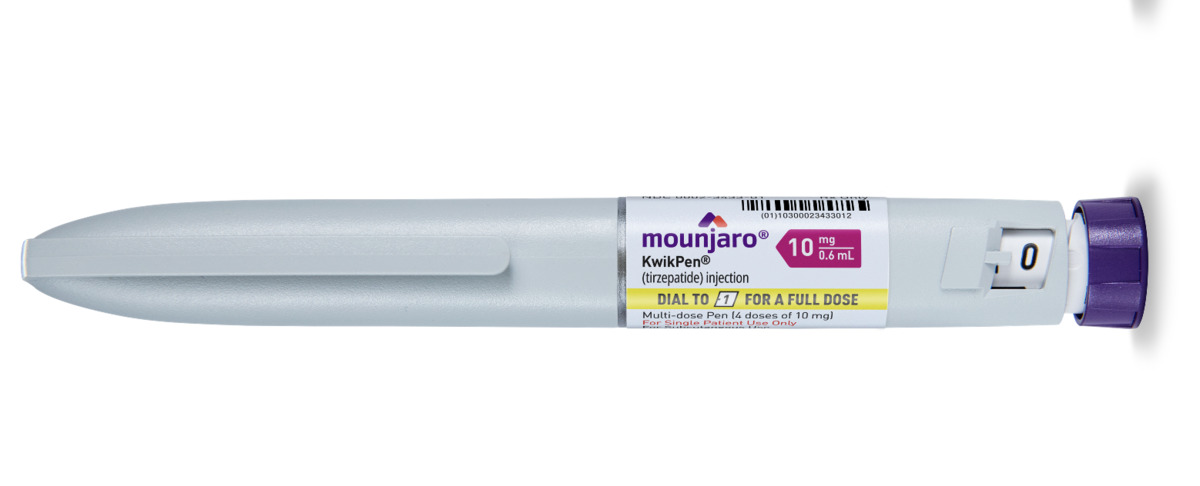Other Options Include
We are currently out of stock for 12.5mg and 15mg, and stocks are expected on 04/06/2025. However, in the meantime, you can place a pre-order for it.
What is Mounjaro (Tirzepatide) for Weight Loss?
Mounjaro® (Tirzepatide) is a once-weekly injectable medication developed by Eli Lilly. As of 2024, the MHRA (Medicines and Healthcare products Regulatory Agency) has authorised Mounjaro for use in adults with obesity (BMI ≥30) or overweight (BMI ≥27) with at least one weight-related comorbidity, such as hypertension, dyslipidaemia, or obstructive sleep apnoea. Mounjaro represents a significant advancement in the medical treatment of obesity, offering a new therapeutic option for individuals struggling to achieve and maintain a healthier weight.
Benefits of Losing Weight
Losing weight offers numerous health benefits that can improve both your quality of life and long-term wellbeing. Achieving and maintaining a healthy weight helps reduce the risk of chronic conditions such as type 2 diabetes, heart disease, high blood pressure, and stroke. Weight loss can also improve joint health, reducing pain and stiffness associated with arthritis. Additionally, shedding excess weight often leads to better sleep quality, increased energy levels, and enhanced mental health by lowering stress, anxiety, and depression. For many, weight loss boosts confidence and supports a more active lifestyle, enabling greater participation in everyday activities and hobbies. Overall, effective weight management is a key step toward living a healthier, longer life.
How Mounjaro Works for Weight Loss
Mounjaro is the first and only approved treatment in the UK that acts as a dual GIP and GLP-1 receptor agonist. It works by mimicking the actions of two key gut hormones:
- GIP (glucose-dependent insulinotropic polypeptide): Supports fat metabolism and insulin sensitivity.
- GLP-1 (glucagon-like peptide-1): Suppresses appetite, enhances satiety, and slows gastric emptying.
This dual hormone action helps reduce hunger, regulate calorie intake, and support sustained weight loss over time. Clinical trials have shown that Tirzepatide can lead to substantial and clinically meaningful reductions in body weight, especially when combined with a reduced-calorie diet and increased physical activity.
Is Mounjaro Right for You?
Mounjaro is available by prescription and should be used under the guidance of a qualified healthcare professional. It is typically considered when lifestyle interventions alone are insufficient to achieve weight loss goals. Treatment is most effective when combined with long-term lifestyle changes, including. dietary improvements and regular physical activity.
How is Mounjaro Taken?
Mounjaro (tirzepatide) is administered as a once-weekly subcutaneous injection, typically into the abdomen, thigh, or upper arm. The injection is delivered using a pre-filled, single-dose pen designed for easy at-home use. Patients can administer the injection themselves after receiving appropriate guidance from a healthcare provider. Mounjaro can be taken at any time of day, with or without food, and should be injected on the same day each week. This once-weekly injection makes Mounjaro a practical option for people managing busy schedules or new to injectable weight loss treatments.
Dosage and Titration Schedule
Mounjaro is started at a low initial dose to help minimise side effects, particularly gastrointestinal symptoms such as nausea. The typical starting dose is 2.5 mg once weekly for four weeks. After this period, the dose is gradually increased in 2.5 mg increments every four weeks, based on individual response and tolerability. The maximum recommended dose for weight loss is 15 mg once weekly. This titration schedule allows the body to adjust to the medication while maximising both safety and effectiveness. Your healthcare provider will closely monitor your progress and adjust the dosage accordingly.
What Does the Research Say About Mounjaro?
Mounjaro has been extensively studied in both diabetes and weight loss populations. In the SURMOUNT clinical trials, tirzepatide demonstrated superior weight loss results compared to other medications, including GLP-1 receptor agonists like semaglutide (Wegovy). Participants without diabetes lost an average of 15% to 22.5% of their body weight, depending on the dose. These results have positioned Mounjaro as a leading treatment for obesity, now licensed in the UK for this indication. Ongoing research continues to evaluate its long-term safety, metabolic benefits, and potential role in preventing obesity-related conditions such as type 2 diabetes, heart disease, and sleep apnoea.
Mounjaro and Contraception
The effectiveness of birth control pills may be reduced when starting Mounjaro (tirzepatide) or after any increase in your dose. To ensure full contraceptive protection, it is essential to use an additional barrier method of contraception, such as condoms, or switch to a non-oral contraceptive method like an intrauterine device (coil) during this time. You should continue using these additional or alternative contraception methods for at least four weeks after starting Mounjaro, and for four weeks following any dose escalation. Always discuss your contraception options with your healthcare provider before beginning treatment with Mounjaro.
Warnings
Mounjaro may cause tumours in the thyroid, including thyroid cancer. Watch for possible symptoms, such as a lump or swelling in the neck, hoarseness, trouble swallowing, or shortness of breath. If you have any of these symptoms, stop treatment straight away, inform us and see your healthcare provider immediately.
Do not use Mounjaro if you or any of your family have ever had a type of thyroid cancer called medullary thyroid carcinoma (MTC).
Do not use Mounjaro if you have Multiple Endocrine Neoplasia syndrome type 2 (MEN 2).
Do not use Mounjaro if you are allergic to it or any of the ingredients in Mounjaro.
Mounjaro (Tirzepatide) and Mental Health: What You Should Know
While Mounjaro is primarily used for weight management, it's important to be aware of its potential effects on mental health. Some patients have reported mood changes, including symptoms of depression or anxiety, during treatment. If you have a history of depression or other mental health conditions, or if you notice new or worsening feelings of sadness, irritability, or changes in mood while using Mounjaro, it is crucial to get in touch and speak with a healthcare professional immediately. A clinician can help assess your symptoms and recommend appropriate support or treatment. Maintaining open communication about your mental health ensures the safest and most effective use of Mounjaro.
Mounjaro (Tirzepatide) and Pregnancy or Breastfeeding
Side Effects of Mounjaro
While Mounjaro (Tirzepatide) is an effective treatment for weight management, it is important to be aware of potential side effects, both common and serious. Common side effects may include nausea, diarrhoea, decreased appetite, vomiting, constipation, indigestion, and stomach pain. These symptoms are typically mild to moderate in intensity and often improve over time. To minimise discomfort, healthcare professionals recommend gradual dose escalation, also known as titration, which allows the body to adjust to the medication in a stepwise manner.
- Inflammation of the pancreas (pancreatitis). Stop using Mounjaro and call your healthcare provider right away if you have severe pain in your stomach area (abdomen) that will not go away, with or without vomiting. You may feel the pain from your abdomen to your back.
- Low blood sugar (hypoglycemia). Your risk for getting low blood sugar may be higher if you use Mounjaro with another medicine that can cause low blood sugar, such as a sulfonylurea or insulin. Signs and symptoms of low blood sugar may include dizziness or light-headedness, sweating, confusion or drowsiness, headache, blurred vision, slurred speech, shakiness, fast heartbeat, anxiety, irritability, or mood changes, hunger, weakness and feeling jittery.
- Serious allergic reactions. Stop using Mounjaro and get medical help right away if you have any symptoms of a serious allergic reaction, including swelling of your face, lips, tongue or throat, problems breathing or swallowing, severe rash or itching, fainting or feeling dizzy, and very rapid heartbeat.
- Kidney problems (kidney failure). In people who have kidney problems, diarrhoea, nausea, and vomiting may cause a loss of fluids (dehydration), which may cause kidney problems to get worse. It is important for you to drink fluids to help reduce your chance of dehydration. Severe stomach problems. Stomach problems, sometimes severe, have been reported in people who use Mounjaro. Tell your healthcare provider if you have stomach problems that are severe or will not go away.
- Changes in vision. Tell your healthcare provider if you have changes in vision during treatment with Mounjaro.
- Gallbladder problems. Gallbladder problems have occurred in some people who use Mounjaro. Tell your healthcare provider right away if you get symptoms of gallbladder problems, which may include pain in your upper stomach (abdomen), fever, yellowing of skin or eyes (jaundice), and clay-colored stools.
Food or liquid getting into the lungs during surgery or other procedures that use anaesthesia or deep sleepiness (deep sedation). Mounjaro may increase the chance of food getting into your lungs during surgery or other procedures. Tell all your healthcare providers that you are taking Mounjaro before you are scheduled to have surgery or other procedures.
Mounjaro Patient Information Leaflet (PIL)
For more information on Mounjaro, please see the PIL, available via the link below:
Patient counselling
- Tirzepatide should be used in conjunction with a healthy, balanced diet and regular physical activity.
- Tirzepatide should be injected at the same time each week and can be administered either before or after meals.
- Injections should be administered in the upper thigh, upper arm, or abdomen (around the umbilical region), with rotation of injection sites.
- The weekly injection day may be changed if necessary, as long as there is a gap of at least 3 days between doses. After choosing a new injection day, continue the once-weekly dosing schedule.
Special Warnings and Precautions for Use
- Gastrointestinal Effects: Tirzepatide can cause gastrointestinal adverse reactions that may lead to dehydration, which, in rare cases, can impair renal function. Patients should be advised of this risk and take appropriate measures to prevent fluid depletion.
- Acute Pancreatitis: GIP/GLP-1 receptor agonists have been associated with acute pancreatitis. Patients should be informed about the signs and symptoms of pancreatitis. If pancreatitis is suspected, Tirzepatide should be discontinued immediately and not restarted if confirmed. Caution is advised in patients with a history of pancreatitis.
- Diabetes Management: Tirzepatide should not be used as a substitute for insulin. When used with insulin or sulfonylureas, there is an increased risk of hypoglycaemia. The dose of insulin or sulfonylurea may need to be reduced when initiating Tirzepatide. The addition of Tirzepatide 2.4 mg in insulin-treated patients has not been evaluated.
- Diabetic Retinopathy: Rapid improvement in glucose control may temporarily worsen diabetic retinopathy. Patients with diabetic retinopathy should be closely monitored and treated per clinical guidelines. There is limited experience with Tirzepatide 2.4 mg in patients with uncontrolled or potentially unstable diabetic retinopathy.
- Sodium Content: This medication contains less than 1 mmol (23 mg) of sodium per dose, which is essentially "sodium-free."
Interaction with Other Medications
- Gastric Emptying: Tirzepatide may delay gastric emptying and potentially affect the absorption of co-administered oral medications. No clinically significant effect on gastric emptying or drug-drug interactions has been observed in clinical trials.
- Oral Contraceptives: Tirzepatide does not directly reduce the effectiveness of oral contraceptives. However, it may pose a risk to pregnancy or reduce effectiveness due to gastrointestinal side effects such as vomiting and diarrhoea, so caution is advised. When co-administered with oral contraceptives containing 0.03 mg ethinylestradiol and 0.15 mg levonorgestrel, no clinically relevant changes in exposure were observed. However, levonorgestrel exposure increased by 20%.








